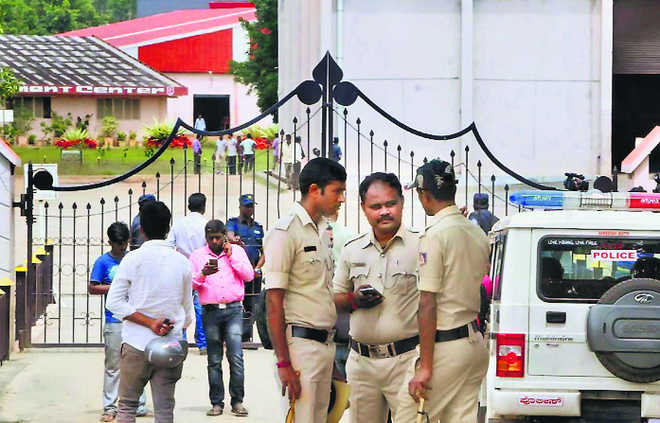
taxing times: State-sponsored “tax terrorism,” similar to the one witnessed in the 1990s, saw everyone — from businessmen to Opposition netas — in the grip of fear
Harish Khare
The dreaded income tax inspector is back. He is back with a vengeance in 2017. He has been recruited in a kind of mercenary force, with a mandate to wage a holy war on black money. The central government is no longer apologetic about letting the taxman loose on any businessman, big or small. Not since the nefarious Conservation of Foreign Exchange and Prevention of Smuggling Activities Act (COFEPOSA) was defanged in the 1990s has the business community lived in such dread of a visitation from any of the coercive instruments in the government’s fiscal arsenal.
Indeed, a former finance minister, Yashwant Sinha allowed himself, in the first week of December, to opine that India was in the grip of “tax terrorism.” This was not a solitary opinion of a senior, embittered BJP leader. Sinha had hit the bull’s eye. This sentiment got registered in the public imagination when the Congress leader Rahul Gandhi began characterising GST as Gabbar Singh Tax, after the much-feared dacoit-boss in the all-time popular movie, Sholay. So pat was this invocation of dread, especially with Gujarat’s trading community, that the Modi government was constrained to tweak the GST regime, making it a less-stringent arrangement, just in time before the state went to polls.
The GST and its built-in demand for digital footprints was only part of the taxman’s minatory story. There is a larger, political mind at work. Having received an unprecedentedly massive mandate in Uttar Pradesh, the Modi political establishment chose to interpret that three-fourth vote as an endorsement of demonetisation; it bred a certain populist arrogance: the Indian voters will support any move that can be sold as being aimed at the miniscule business community. The bania, in any way, never enjoyed much of a social respect in the caste-conscious Indian society. Masses can be worked up, even instigated against the businessman, the “black money” hoarder and the very man who was obstructing the nation’s march towards greatness.
With demonetisation came the push for a Digital India. Once a businessman — or, for that matter any citizen — has left behind a digital footprint, he becomes a legitimate target for the taxman, his queries, to be mostly followed by the ubiquitous “income tax raid.”
Ask any businessman and nine times out of 10, he would have a tale of woe to tell, either about his own unpleasant encounter with the taxman or of some friend, relative or business partner subjected to a similar indignity.
On December 22, the Lok Sabha was informed, by Mr Shiv Pratap Shukla, Hon’ble Minister of State for Finance, in a written reply to a question, that between November 2016 and March 2017, the Income Tax department had conducted searches on around 900 groups. According to Mr Shukla, the taxmen also collected “undisclosed income of over Rs 7,900 crore.” Besides this, 8,200 “surveys” were conducted, which extracted detection of undisclosed income of more than Rs 6,700 crore. And, Mr Shukla’s inspectors were not done yet. From April 2017 to October 2017, more groups — around 275 — were searched, which yielded a haul of Rs 7,800 crore in undisclosed income.
On December 23, 2017, on its business page, the Asian Age carried six stories, each providing a chapter in the larger book of a government at a fiscal war with the entrepreneurial community. The SEBI, the Income Tax department, and the Enforcement Directorate replaced the policeman as a symbol of a capricious authority.
The same page also had West Bengal Finance Minister Amit Mitra assert that the GST, heralded with so much fanfare and invested with so much political capital, was more primitive in its implementation than the VAT regime. According to him, a parliamentary panel had calculated that at least 10 to 15 per cent of the working capital of exporters was locked up. There is no tyranny greater than that of an incompetent government.
And, the same page in the same newspaper, also had a story of government denying that it had any plans to close down any public sector bank! The rumour and the fact that the government felt the need to deny it should give an idea of uncertainty and fear that have crept into the Indian economy.
Early this year, an Economist cover story (June 24, 2017) on Indian economy had captured the core of the new unpredictability, now institutionalised in decision-making: “With even senior ministers relegated to the edges of a policymaking machine run by a tight group around him, few people know what Mr Modi has in mind.”
A terrifyingly unsettling message has gone out: The Modi establishment is not averse to introducing disruption in the economic policies, laws and regulations — not necessarily for sound economic reasons but in a quest for electoral dividends and political advantages and to cultivate an image of a strong man at work. The business community has keenly sensed this streak of irrational adventurism; the foreign investor has postponed his visit; while the desi entrepreneur is hoarding back his surplus. The economy is not booming. In its pique and insatiable lust for more resources, the government has unleashed the taxman on the hapless citizen.



























